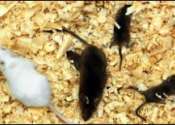Juvenile mice secrete a protective pheromone in their tears, blocking adult mating
Nocturnal animals need their noses to stay alive. Mice, among others, depend on their impressive olfactory powers to sniff out food or avoid danger in the dark.

Nocturnal animals need their noses to stay alive. Mice, among others, depend on their impressive olfactory powers to sniff out food or avoid danger in the dark.
Plants & Animals
Oct 2, 2013
0
0

Fish fail to detect danger in copper-polluted water. A new study, to be presented at the meeting of the Society for Experimental Biology on the 5th of July, shows that fish cannot smell a danger odor signal emitted by other ...
Plants & Animals
Jul 4, 2013
0
0

When a mouse smells a cat, it instinctively avoids the feline or risks becoming dinner. How? A Northwestern University study involving olfactory receptors, which underlie the sense of smell, provides evidence that a single ...
Biotechnology
Apr 29, 2013
0
0
(Phys.org) —Increases in ground-level ozone, especially in rural areas, may interfere not only with predator insects finding host plants, but also with pollinators finding flowers, according to researchers from Penn State ...
Environment
Apr 2, 2013
0
0

Highly developed antennae containing different types of olfactory receptors allow insects to use minute amounts of odors for orientation towards resources like food, oviposition sites or mates. Scientists at the Max Planck ...
Plants & Animals
Mar 18, 2013
0
0

The first complete map of the ants' olfactory system has discovered that the eusocial insects have four to fives more odorant receptors—the special proteins that detect different odors—than other insects.
Plants & Animals
Sep 10, 2012
0
0
(Phys.org) -- A University of California, Davis, discovery that male navel orangeworms respond more readily to artificial or "deceitful" female sex pheromones than to natural sex pheromones could lead to a better mating disruption ...
Plants & Animals
Jul 26, 2012
0
0

(Phys.org) -- Max Planck scientists have found out that the olfactory system in hermit crabs is still underdeveloped in comparison to that of vinegar flies. While flies have a very sensitive sense of smell and are able to ...
Plants & Animals
Jul 4, 2012
0
0

(Medical Xpress) -- Fruit flies don't have noses, but a huge part of their brains is dedicated to processing smells. Flies probably rely on the sense of smell more than any other sense for essential activities such as finding ...
Biotechnology
Jan 19, 2012
0
0
When mice smell the scent of food on the breath of their fellow mice, they use that experience to decide what's safe to eat in the future. Key in that learning process is the pairing of a particular odor with a chemical ingredient ...
Plants & Animals
Jul 15, 2010
0
0